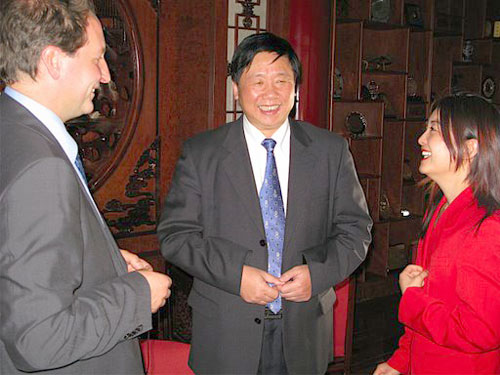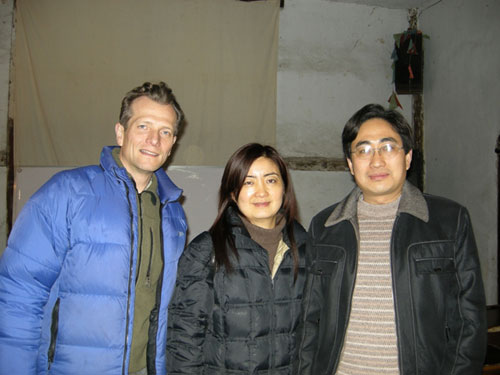
(摄制组Paul Webster和戴小平采访中国国家宗教事务局局长叶小文)

(Cogent/Benger制作人Chris Sumpton,戴小平,和四川最大的教堂南充教会的牧师王光辉)
(星星生活记者万卷报导)当前世界各国的目光都聚集在中国的经济市场,但人们是否关注到在对外开放后,生活发生了剧变的中国人民的精神世界。由多次获奖的加拿大纪录片公司和vision电视台一起合作,资深传媒人士参与的纪录片《中国的宗教信仰复兴》将在北京奥运前播出,这部纪录片将是加国首次播出深入报道中国宗教现状的英语纪录片。
纪录片的制作方是Cogent/Benger公司。从1997年以来,该公司已经为CBC, Vision, Bravo, Discovery和CTV制作了几十部长篇纪录片,主题从尖端科技,到古代的历史、体育、医学和精神。这次,他们将目光对准中国的宗教。
纪录片《中国的宗教信仰复兴》(China’s Leap of Faith)分为两个部分。第一部是《佛神回家――佛教、道教和民间信仰》(THE GODS COME HOME – Buddhism, Taoism and Folk Religions),第二部是《紫竹十字架》(BAMBOO CROSS – Christianity)。
前OMNI国语节目负责人兼主持人戴小平介绍说,这两部纪录片长度均为一个小时。前者是由Paul Webster和她共同导演,主要反映已经融入中国文化,历史比较悠久的本土宗教;后者由Chris Sumpton 导演,她在片中任副监制,主要是反映外来宗教–基督教和天主教在中国的发展。
在今日中国,宗教仍然是比较敏感的话题。戴小平表示,选择这个题材的原因之一是合作方是宗教电视台,从策划到开镜,直至最后封镜用了差不多一年的时间。她说,中国经济的高速增长非常引人注目,因此相关的报道较多。随着生活水平的提高,人们对精神的追求就自然而然提高。
“但一些媒体忽略了这一点。”戴小平认为,即使报道中涉及有关中国宗教的,也以负面的新闻如中国镇压地下教会等居多。但不能因为有地下教会的存在,就认为中国没有教会,就不能去教堂,不能做祷告。她说,这是一个错误的观念。
在即将播出的纪录片中也涉及到地下教会这个现象。戴小平说,因为在中国确实有不少地下教会的存在,也存在着一些信徒被打压迫害,家庭聚会教堂被摧毁的事情,这些情况在一些偏僻的地带较为严重,一些地方官员的思想保守,落后,对宗教缺乏一个正确的认识。
戴小平认为,在中国,教会可以分为地上和地下两类。地上教会属于经过政府登记注册的,地下教会主要是指没有登记的教会。戴小平说,这是一个灰色地带,并没有向黑白那样分明。一般的小型家庭聚会,政府通常睁一眼,闭一眼。但有些地下教会聚会政府会加以取缔, 因为他们所传授的内容和形式不被一些政府机构接收。
一个不容忽视的事实是,现在中国信仰宗教的人口越来越多,信徒增长的速度亦很快。中国官方的中国日报去年公布的一个调查数据显示,全国有3亿多人信仰宗教,而且年龄趋向年轻化,外界解读为中国宗教的复兴,并认定为当代历史上最大规模的宗教复兴潮。
戴小平认为,现在社会经济的发展,对人的精神和心灵造成诸多不平衡,人们之前是追求温饱,但温饱之后不少人便开始寻求精神世界的寄托。
此外,近20年来,中国政府对宗教采取比较开放的政策和措施也是造成的结果。戴小平说,现在信教的人尤其是信仰基督教的越来越多,这可能是大学的文化教育以及对西方社会的开放等因素导致的。
全球性的佛教、道教大会近年来先后在中国举行,有人认定这是一种国家行为,在这一现象的背后是否存在中国大力提倡本土宗教来限制外来宗教的发展?戴小平认为,没有很明显的感觉到。政府是对宗教的态度是谨慎支持和控制,以免出现对政府不利的团体,违反法律就要制裁。因为复兴潮是政府所不能控制的。中国还是要注意国际形象。
“基督教在中国的发展速度其实非常快,”戴小平说,因为各地建的教堂越来越多,但政府一直努力把基督教变成不受西方影响的、中国本土化的宗教,不欢迎外国传教士,而且也不容许有不同宗派的存在,这也是造成了很多地下教会存在的一个原因。 但一些天主教徒家中,都挂有梵蒂冈主教的照片。受访者说,这是宗教,至于梵蒂冈和北京的关系,那是政治。他们说,“我们都相信同一个上帝,跟政治没有关系,是宗教关系。”
为拍摄这部纪录片,摄制组先后两次专程赴中国,深入北京、上海、香港、河北、四川、浙江、江苏、福建和香港等城市和乡村的寺庙、教堂,采访了大量教徒、住持、牧师、神父、主教,并参加一些当地的宗教节日。
中国国家宗教事务局局长叶小文,中国佛教协会副会长、上海玉佛寺方丈觉醒法师,九十高龄的上海天主教主教金鲁贤等宗教界重量级著名人物都先后接受采访。戴小平说,很幸运,在普陀山偶遇凤凰电视台台长刘长乐,这个著名的佛教人士也接受了摄制组的采访。
出现在镜头中的叶小文局长很少接受西方电视采访。叶小文承认中国确实存在不少问题,但中国对宗教是持开放的态度。叶小文希望摄制组能真实报道,“我们有问题你们报没关系,只要实事求是。”
戴小平坦诚采访中也遇到不少困难。大城市的宗教界人士还有一些高层宗教人士比教开明。但是,一些地方官员和农村干部则不同,他们比较担心。在一些敏感的话题上,也不时遇到刁难。他们有时会旁听,有时还会录音,普通的教友或信徒在回答时可能会有一些忌讳。“因为我们是带着西方人所关心的问题进行访问,问了不少尖锐的问题,我觉得他们的回答都比较小心,毕竟有时有当地的官员陪同。”
戴小平表示,尽自己一份力让西方人能客观地了解一个真实的中国是她的一直以来的心愿。经过这次采访和西方制片人以及一些中国官员的合作,感受到中西方之间隔阂。她说,西方媒体对中国的报道有时不够全面,很大部分是因为文化教育背景的不同,认识事物的角度不一样。此外,中国方面也应该打开大门,让西方更全面地来暸解,这样双方就不会有互相抵触的情绪。戴小平自我评价说,这两部纪录片拍得比较公正全面。
据悉,这两部分别为一小时长的纪录片将在罗杰士有线台60 频道的全国性的多宗教信仰台VisionTV电视台播出,播出的时间分别是东岸时间为七月二十二日和七月二十三日晚上九点,西部时间晚上六点和九点。
1 Comment
Leave a Comment
要发表评论,您必须先登录。







Making a doc under China’s watchful eye
GUY DIXON
From Tuesday’s Globe and Mail
July 22, 2008 at 3:30 AM EDT
Ahead of the Beijing Olympics, China’s proclaimed openness to foreign media is being sorely tested, as a Canadian documentary film crew found in the heart of Hebei province.
It happened when the filmmakers were interviewing a priest on camera. As he answered their questions about the state of religious freedom in China, Father Lu Zhi Zong, a priest in the Catholic enclave of Donglu, a village 150 kilometres south of Beijing, kept glancing over at three local authorities who were monitoring his every word.
Authorities keep close tabs on Father Lu because his village is a major pilgrimage site, given its shrine to the Virgin Mary. The site, honouring an apparition of Mary that was reported in 1900, annually drew huge crowds of pilgrims before a mid-1990s crackdown by authorities.
During the interview, the officials videotaped the priest behind the back of Canadian filmmaker Diana Xiaoping Dai. “When I did the interview, I noticed that Father Lu was very nervous. He answered my questions, but I could tell he was nervous,” she said. “Honestly, if I knew they were filming him, I would probably have asked less tough questions.”
Diana Xiaoping Dai is one of three filmmakers who contributed to the documentary China’s Leap of Faith, which airs this week. (Kevin Van Paassen/The Globe and Mail)
The interview is a key component in the two-part documentary series China’s Leap of Faith, broadcast tonight and tomorrow on Vision TV. The series explores the explosive revival of religions in China and the central government’s policy of recognizing only certain religious groups while at the same time clamping down on any large gatherings or mass pilgrimages.
Authorities are also interested in what information gets out.
The local officials “were hanging around, almost crowding in on us, to make sure they heard every word and to make sure we knew they were listening to every word – and that Father Lu knew they were listening to every word,” said Christopher Sumpton, one of the directors of the doc series. “In fact, the officials said they didn’t want us to use some of his answers and that they would like to take the tape. We refused, and we went through a number of negotiations. Eventually, we got out of there with the tape.”
He added that the encounter wasn’t hostile enough to get physical, “but I was concerned it would get to that.”
Dai’s ability to conduct interviews in Chinese and her sensitivity to the political nuances were essential. “She is able culturally to know how far to go and to see how people were reacting, and to push them a little further,” Sumpton said, but added: “As responsible filmmakers and fellow humans, we don’t want them to get into trouble. So if we egg them on and make them say things that can be troublesome for them, that’s not good for us to do. However, we want them to reveal as much as they comfortably can. So that kind of a dance had to be danced the entire time during the interview.”
Yet at first, the documentary-makers had an easy time getting permission to shoot in China.
The Chinese consulate in Toronto had smoothed the way, largely due to Dai’s reputation as the former host and producer of Omni News’ Canadian Chinese-language news broadcast. Then China’s State Administration for Radio and Television, which among its many oversight duties handles foreign media, got involved. It assigned local fixers (often filmmakers themselves) to make flight arrangements for the Canadians, book hotels and secure film permits in each province and locale.
“The bureaucracy at every level had to be contacted,” Sumpton said, “and for these people from the State Administration for Radio and Television, that was the job for which we paid them. At the same time, they accompany you everywhere, and they are there to make sure you stay within the pre-arranged envelope.”
Still, “there are so many regulations, and the laws are often unclear … Everything is up for negotiation,” he said. “And that’s how it was when we were shooting. We would know that we were not supposed to talk to this person, but we might go over and talk to them on the spur of the moment. It might make our fixer uncomfortable, but he would kind of look the other way.”
Dai, Sumpton and the series’s other director, Paul Webster, were granted the highest level of co-operation when they were permitted to interview the central government’s minister of religion, Ye Xiao Wen.
“We were extremely surprised that we were allowed to do it,” noted Sumpton. “We thought that we would be turned down. So I think that demonstrates something. Four or five years ago, we couldn’t have done this, for sure. Every year there is change and more freedom, and more openness to the outside.”
And yet there’s a wide gulf between top-level officials and local cadres, and it’s the hurdle more foreign crews will face as they fan out beyond Beijing, leading up to and during the Olympic Games. Those behind-the-scenes political mechanics could affect what gets reported by foreign media this summer and how it’s reported.
“The local level and the national level may not be on the same wavelength,” Sumpton said. “The local officials may be fairly old-fashioned, more conservative or traditionalist – and frankly more driven by power and ego. They have the latitude. It’s their zone. They are the bosses in that area. It doesn’t matter what the national government says in some ways.”
China’s Leap of Faith airs on Vision TV today and tomorrow at 9 p.m.
http://www.theglobeandmail.com/servlet/story/RTGAM.20080722.wchina22/BNStory/Entertainment/home